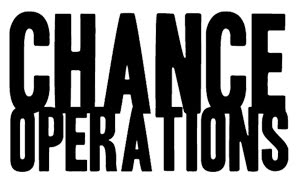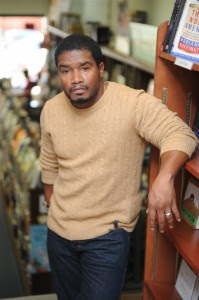Jason Vasser will be a featured reader at the •chance operations• reading at Tavern of Fine Arts, 313 Belt Avenue, on Monday, January 25.
Doors open at 7:30 p.m.; admission is FREE. [Note: Tavern of Fine Arts opens at 5:00 p.m. for pre-reading dinner and drinks, which will also be served throughout the evening.]
Jason Vasser lives and writes in Saint Louis Missouri, where he earned a Master of Fine Arts degree in creative writing from the University of Missouri – St. Louis (UMSL). His poetry has appeared in Blast Furnace, The Sphinx Magazine, Prairie Gold: An anthology of America’s Heartland, among others and was recently featured in the St. Louis Post Dispatch in an article written by Jane Henderson titled “Poetry can be an early form of artistic response to trauma”, in response to issues in Ferguson, Missouri. He is the author of the chapbook, Agapornis and has a full length collection of poems Shrimp forthcoming.
Jason believes that building relationships sustains community. Over the past few of years, he has worked with the St. Louis Poetry Center (SLPC) as coordinator for the Poetry on the Plaza reading series and as Assistant Curator of Poetry at the Point, and endeavors to continue working to bring the literary community together through programming and collaboration.
Now a board member at the St. Louis Poetry Center, Jason served as curator for the SLPC’s benefit gala honoring Dr. Maya Angelou. This event featured local literary legends, musicians, modern dancers, and an up and coming visual artist. While often working behind the scenes, Jason also reads his poetry at local events, large and small, to share in the recitation of poetry with his elders, contemporaries, and for the literary enthusiast. His work lives on and off the page as he performs spoken word poetry at some events, while also reading at others; Jason is a performance poet, activist for racial equality, and educator.
With a degree in cultural anthropology and a Master of Fine Arts in creative writing, Jason weaves art and science to bring to life the patterns in life that unite humanity, while also speaking to his experience as a minority. Tracing his ancestral homeland to the Bamileke people of Cameroon, in West Africa, Jason currently uses his poetry as a bridge to connect the past, present and future.
Currently, Jason teaches English at Harris–Stowe State University. A member of various professional anthropological and literary organizations, he finds time to also volunteer his time with local chapters of his fraternity, Alpha Phi Alpha Fraternity Inc.
Jason says, “Regardless of your cultural background, poetry is a bridge we can use to communicate.”
Poetica in the round
After Lawrence Fertinghetti
Poets, lift your heads
put down pencil and pen
the sun is abound, though rain
is around the corner, now is time
to open your doors and
greet the sky,
the sprouts
between concrete,
come down
come out, from your coffee houses,
and Ivory towers, your soap boxes
and greet the wind.
Down from your gated,
out from the ground level,
the trees lean in desperate need
lift them in verse – there is no time
as we see ash,
no more propaganda
from the sidelines
while Ferguson burns,
Saint Louis burns,
T.S. Elliot’s burns
Sara Teasdale’s burns,
Maya Angelou turns in her grave
night and shadow approaches
stay, don’t leave
there is No time for the artist to hide
in books, writing pads, laptops,
libraries, we must take it to the street
where voices are needed to guide
take it to the ghetto,
take it to the suburbs
take it to where Delmar divides
make time to listen,
poetry isn’t a secret society
we live, work, we write
and play where everyone else does
the hour of pondering is over,
put down your mind
pick up your heart
The time for loving has come
the time for hating has ended
let’s talk like those around which we live
and not use big words,
treat every word like pepper
to a chicken needed to feed the village.
-- Jason Vasser


